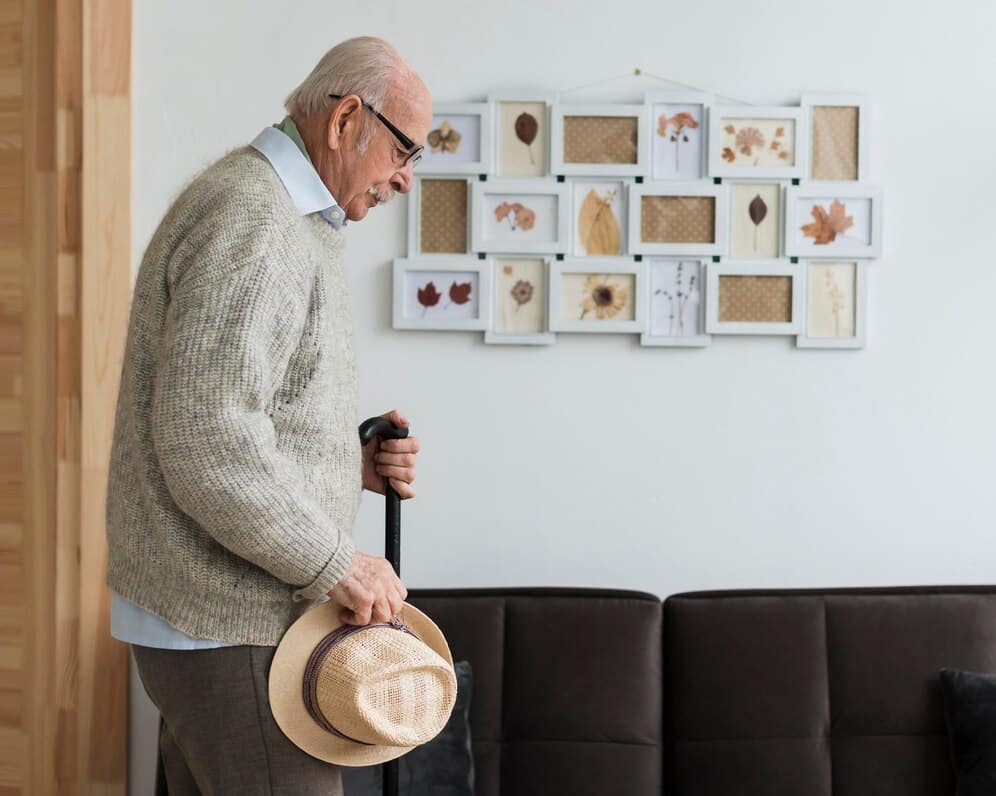The Most Common Dementia Behaviors in the Elderly
The most common dementia behaviors in the elderly are often referred to as “dementia-related behaviors.” These behaviors can be challenging for caregivers, but it’s essential to understand that they are a natural part of the dementia progression. Up to 90% of dementia patients experience behavioral changes, including confusion, aggression, sleep problems, and wandering.
Prevalence and Impact
Most caregivers will encounter dementia behaviors at some point during their loved one’s journey. These behaviors can be distressing for both the caregiver and the person with dementia, leading to feelings of frustration, guilt, and anxiety. It’s crucial to recognize that these behaviors reflect not the person’s character but rather a disease symptom.
Importance of Recognizing Early Signs
Elderly individuals with dementia may exhibit subtle changes in behavior that can be easily overlooked or misinterpreted. Recognizing these early signs is vital to providing effective care and support. By understanding the underlying causes of dementia behaviors, you can develop strategies to manage them and improve your loved one’s quality of life.
Understanding the complexities of the disease is essential to better cope with dementia behaviors. Dementia is a progressive condition that affects not only memory but also mood, behavior, and cognitive function. By recognizing the early signs of dementia behaviors, you can address them proactively, reducing the risk of caregiver burnout and improving the overall well-being of your loved one.

Importance of Recognizing Early Signs
Dementia Behavior: Confusion
While confusion is a common symptom of dementia, it can be particularly challenging for caregivers to navigate. As brain changes occur with dementia, confusion can become more frequent, leading to feelings of frustration and anxiety for both the individual with dementia and their caregivers.
Causes and Triggers
For individuals with dementia, confusion can be triggered by various factors, including environmental changes, poor communication, lack of prompting and cueing, sundown syndrome, and unexpected changes. Additionally, paranoia and hallucinations can also contribute to confusion.
Strategies for Managing Confusion
One of the most effective ways to manage confusion in individuals with dementia is to simplify their environment and interactions. This can include providing structure, using labels and calendars, and asking yes or no questions to help them feel more grounded.
This approach can help reduce anxiety and frustration, allowing caregivers to support their loved ones better. By accepting the confusion and adapting to their reality, caregivers can create a more peaceful and supportive environment for everyone involved. At The Oaks at Paso Robles, we understand the challenges of caring for a loved one with dementia. We are committed to providing the support and resources you need to navigate these complex behaviors. Contact us today at (805) 239-5851 to learn more about our memory care services.
Dementia Behavior: Aggression
Assuming you’ve experienced aggression from your loved one with dementia, you’re not alone. Verbal threats and physical aggression can be among the more severe dementia behaviors, occurring seemingly out of nowhere. These verbal or physical outbursts may happen in the middle to a later stage of dementia when patients can’t communicate their needs.

Dementia Behavior: Aggression
Understanding the Underlying Causes
One of the primary reasons aggression occurs in individuals with dementia is due to confusion, physical pain or another unmet need, frustration, emotional pain, discomfort with a specific task, reactions to medications, vision or hearing loss, sundown syndrome, or fear. By understanding the underlying causes, you can better address the issue’s root and develop effective coping strategies.
De-escalation Techniques and Interventions
To handle aggression in individuals with dementia, it’s imperative to employ de-escalation techniques and interventions. Most importantly, try not to take the aggressive behavior personally, and remember that this is the disease talking, not the person.
Reassuring, reorienting, redirecting, and reminiscing can help calm the situation. Listening to their concerns, avoiding arguments, and taking the blame can also help defuse the situation. Using these strategies, you can reduce the frequency and severity of aggressive outbursts and improve the overall quality of life for you and your loved one.
What Level of Care Do You Need?
Discover the level of care you or your family member requires.
Dementia Behavior: Sleep Problems
To understand and cope with dementia behaviors, it’s crucial to address sleep problems, which affect up to 90% of people with dementia. Disruptions to the sleep-wake cycle can lead to agitation, aggression, and confusion, making it challenging for caregivers to manage.
Disruptions to the Sleep-Wake Cycle
An irregular sleep-wake cycle can significantly contribute to dementia behaviors. People with dementia may experience difficulty falling asleep, staying asleep, or experiencing excessive daytime sleepiness. This can be caused by medication side effects, pain, or discomfort, leading to restlessness and agitation.

Disruptions to the Sleep-Wake Cycle
Promoting Restful Sleep and Relaxation
Establishing a consistent daily routine, encouraging physical activity, and creating a sleep-conducive environment can influence sleep-wake patterns. By promoting restful sleep and relaxation, caregivers can help reduce the likelihood of sleep-related dementia behaviors.
Restful sleep is crucial for people with dementia, as it can help regulate their mood, reduce agitation, and improve their overall well-being. Caregivers can promote restful sleep by establishing a relaxing bedtime routine, ensuring the sleep environment is comfortable and quiet, and encouraging their loved ones to avoid stimulating activities before bedtime. Additionally, caregivers can help their loved one stay active during the day by engaging in physical activities, such as walking or stretching, to promote better sleep at night.
Dementia Behavior: Wandering
Keep in mind that wandering is an expected behavior in people with dementia, and it’s crucial to understand the underlying reasons behind it. According to the Understanding Behavioral Changes in Dementia, wandering can be caused by boredom, anxiety, or the need for exercise. As a caregiver, it’s crucial to identify the triggers and develop strategies to prevent and manage wandering.
Risks and Consequences
An individual with dementia who wanders can face significant risks, including getting lost, injured, or exposed to harsh weather conditions. Moreover, wandering can lead to feelings of anxiety, fear, and confusion, which can exacerbate the condition. It’s crucial to take proactive measures to ensure the safety and well-being of your loved one.
Safety Measures and Prevention Strategies
Prevention is critical to managing wandering in individuals with dementia. Some effective strategies include creating a safe and secure environment, providing regular exercise and mental stimulation, and using identification devices such as GPS tracking or wearable alarms.
Understanding the underlying causes of wandering is crucial in developing effective prevention strategies. For instance, if your loved one tends to wander due to boredom, engaging them in activities such as puzzles, games, or hobbies can help reduce the likelihood of walking. Ensuring their basic needs, such as providing regular meals and hydration, can also help minimize wandering behavior.
If you’re concerned about your loved one’s wandering behavior, consider calling The Oaks at Paso Robles, a memory care community in Paso Robles, CA, at (805) 239-5851 for guidance and support.
Coping Mechanisms for Caregivers
All caregivers need support and guidance to navigate the challenges of caring for a loved one with dementia. According to Harvard Health, “Dementia: Coping with common, sometimes distressing behaviors” requires a multifaceted approach. By understanding the causes of dementia behaviors and developing effective coping strategies, you can reduce stress and improve the quality of life for both yourself and your loved one.
Emotional Support and Self-Care
To maintain your emotional well-being, it’s vital to prioritize self-care and seek support from others—contact friends, family, or support groups to share your experiences and feelings. Engage in activities that bring you joy and help you relax, such as exercise, meditation, or hobbies.

Emotional Support and Self-Care
Building a Support Network
To build a strong support network, identify people who can provide emotional, physical, and practical assistance. This may include family members, friends, neighbors, or professional caregivers. Feel free to ask for help when needed, and consider joining a support group to connect with others facing similar challenges.
Caregivers often prioritize their loved one’s needs, but it’s crucial to remember that you can’t pour from an empty cup. By building a support network and prioritizing your well-being, you’ll be better equipped to provide the care and support your loved one needs. At The Oaks at Paso Robles, we understand the importance of caregiver support and offer resources and guidance to help you navigate the challenges of dementia care. Contact us at (805) 239-5851 to learn more.
Creating a Supportive Environment
Despite the challenges of caring for a loved one with dementia, you can create a supportive environment that promotes comfort, calmness, and independence. Making a few simple adjustments to their living space and daily routines can help reduce stress and anxiety and improve their overall well-being.
Adapting the Living Space
People with dementia face numerous challenges daily that can lead to frustration, anxiety, and agitation. By adapting their living space to meet their unique needs, you can help reduce these feelings and create a more supportive environment. This can include simplifying their surroundings, reducing clutter, and using visual cues to help them navigate their space.
Encouraging Independence and Autonomy
Independence is a vital aspect of human dignity, and people with dementia are no exception. By encouraging independence and autonomy, you can help them feel more in control of their lives, even as their abilities decline. This can involve providing opportunities for them to make choices, engaging in activities they enjoy, and offering support and guidance when needed.

Encouraging Independence and Autonomy
Space to make decisions and take action can be incredibly empowering for individuals with dementia. You can help them maintain their self-worth and confidence by providing a supportive environment that encourages independence. This can be achieved by offering choices, such as what to wear or eat, and providing opportunities for them to engage in activities they enjoy, such as gardening or cooking. Additionally, you can help them maintain their independence by providing assistive devices, such as walkers or canes, and offering support and guidance when needed.
If you’re seeking expert advice on creating a supportive environment for your loved one with dementia, consider contacting The Oaks at Paso Robles, a memory care community in Paso Robles, CA. Their team of experienced professionals can provide you with personalized guidance and support to help you create a safe, comfortable, and empowering environment for your loved one. Call them today at (805) 239-5851 to learn more.
Find Where You Belong
Dive into the vibrant life our Westmont communities have to offer.
Summing up:
So, you’ve learned that up to 90% of people with dementia exhibit challenging behaviors and that understanding and coping with these behaviors is crucial for both caregivers and loved ones. By recognizing the common behaviors associated with dementia, such as confusion, aggression, sleep problems, and wandering, you can better manage these behaviors and improve the quality of life for everyone involved. Bear in mind that you are not alone in this journey, and resources like Alzheimer’s and Dementia Behavior Management Tips are available to support you. At The Oaks at Paso Robles, we’re committed to providing a safe and supportive environment for individuals with dementia and their caregivers. Contact us at (805) 239-5851 to learn more about our services and how we can help you navigate the complexities of dementia behaviors.








